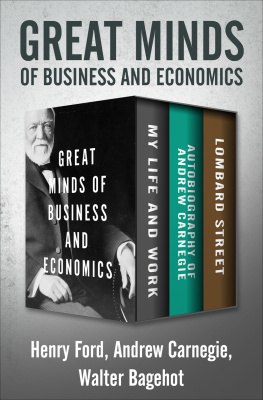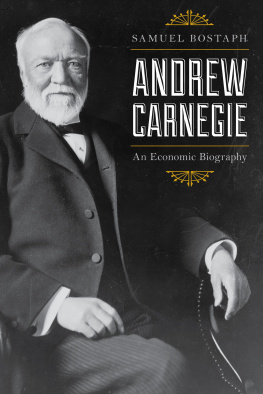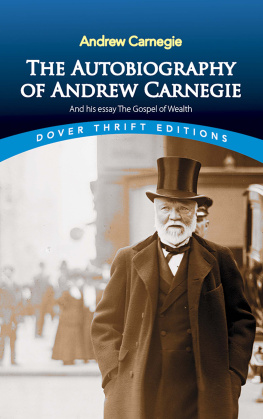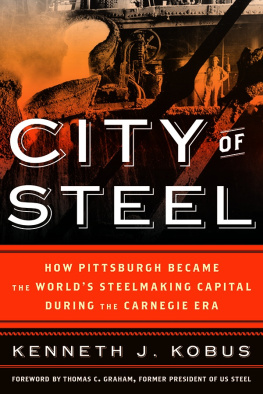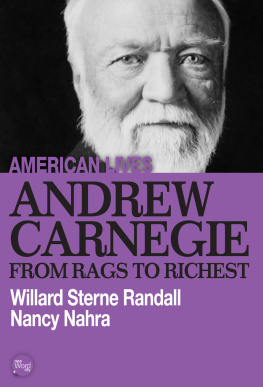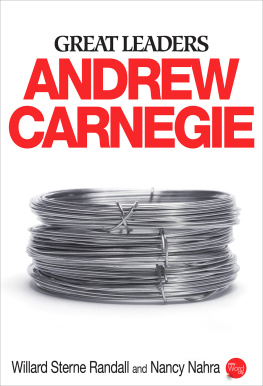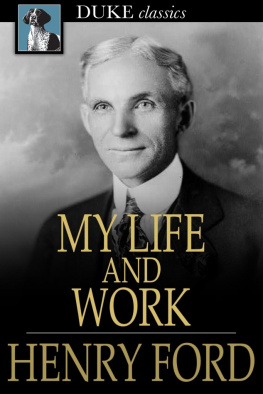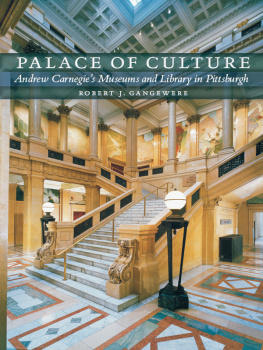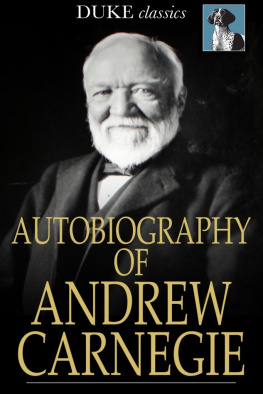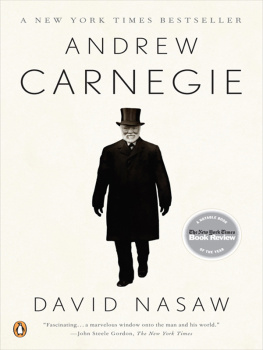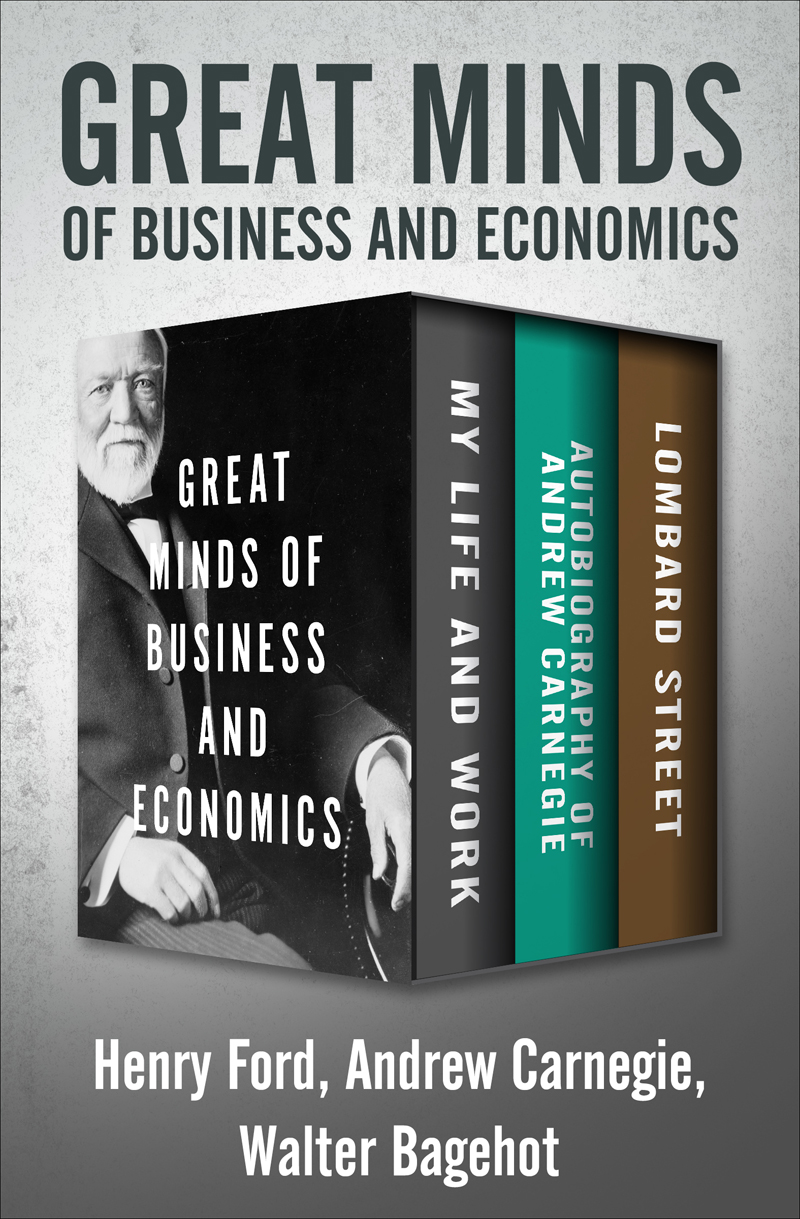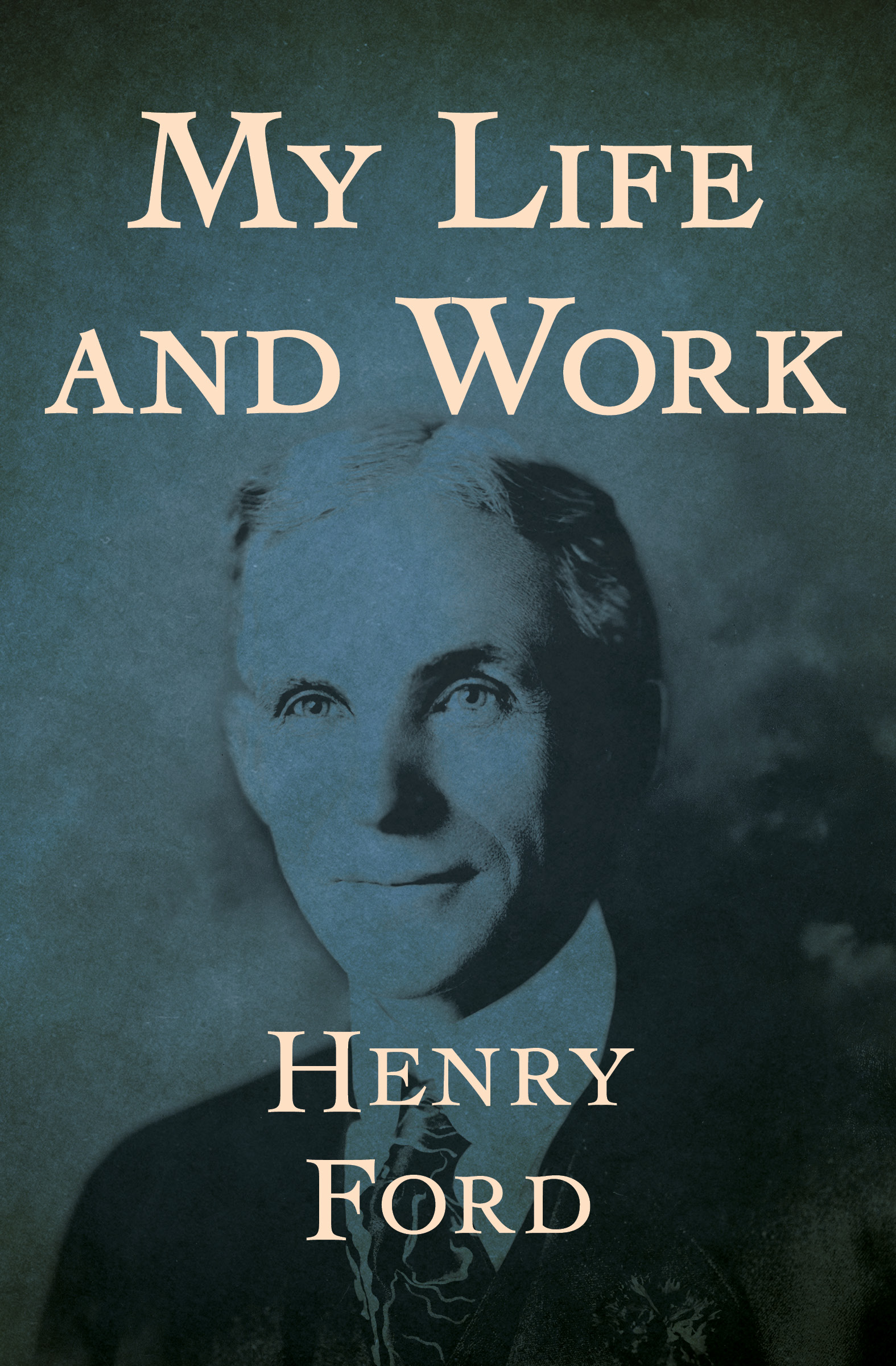
Great Minds of Business and Economics
My Life and Work, Autobiography of Andrew Carnegie, and Lombard Street
Henry Ford, Andrew Carnegie, and Walter Bagehot

CONTENTS

Find a full list of our authors and
titles at www.openroadmedia.com
FOLLOW US
@OpenRoadMedia



My Life and Work originally published in 1922
Autobiography of Andrew Carnegie originally published in 1920
Lombard Street originally published in 1873
Cover design by Amanda Shaffer
ISBN: 978-1-5040-6458-3
This edition published in 2020 by Open Road Integrated Media, Inc.
180 Maiden Lane
New York, NY 10038
www.openroadmedia.com

My Life and Work
Henry Ford

INTRODUCTION: WHAT IS THE IDEA?
We have only started on our development of our countrywe have not as yet, with all our talk of wonderful progress, done more than scratch the surface. The progress has been wonderful enoughbut when we compare what we have done with what there is to do, then our past accomplishments are as nothing. When we consider that more power is used merely in ploughing the soil than is used in all the industrial establishments of the country put together, an inkling comes of how much opportunity there is ahead. And now, with so many countries of the world in ferment and with so much unrest every where, is an excellent time to suggest something of the things that may be done in the light of what has been done.
When one speaks of increasing power, machinery, and industry there comes up a picture of a cold, metallic sort of world in which great factories will drive away the trees, the flowers, the birds, and the green fields. And that then we shall have a world composed of metal machines and human machines. With all of that I do not agree. I think that unless we know more about machines and their use, unless we better understand the mechanical portion of life, we cannot have the time to enjoy the trees, and the birds, and the flowers, and the green fields.
I think that we have already done too much toward banishing the pleasant things from life by thinking that there is some opposition between living and providing the means of living. We waste so much time and energy that we have little left over in which to enjoy ourselves.
Power and machinery, money and goods, are useful only as they set us free to live. They are but means to an end. For instance, I do not consider the machines which bear my name simply as machines. If that was all there was to it I would do something else. I take them as concrete evidence of the working out of a theory of business, which I hope is something more than a theory of businessa theory that looks toward making this world a better place in which to live. The fact that the commercial success of the Ford Motor Company has been most unusual is important only because it serves to demonstrate, in a way which no one can fail to understand, that the theory to date is right. Considered solely in this light I can criticize the prevailing system of industry and the organization of money and society from the standpoint of one who has not been beaten by them. As things are now organized, I could, were I thinking only selfishly, ask for no change. If I merely want money the present system is all right; it gives money in plenty to me. But I am thinking of service. The present system does not permit of the best service because it encourages every kind of wasteit keeps many men from getting the full return from service. And it is going nowhere. It is all a matter of better planning and adjustment.
I have no quarrel with the general attitude of scoffing at new ideas. It is better to be skeptical of all new ideas and to insist upon being shown rather than to rush around in a continuous brainstorm after every new idea. Skepticism, if by that we mean cautiousness, is the balance wheel of civilization. Most of the present acute troubles of the world arise out of taking on new ideas without first carefully investigating to discover if they are good ideas. An idea is not necessarily good because it is old, or necessarily bad because it is new, but if an old idea works, then the weight of the evidence is all in its favor. Ideas are of themselves extraordinarily valuable, but an idea is just an idea. Almost any one can think up an idea. The thing that counts is developing it into a practical product.
I am now most interested in fully demonstrating that the ideas we have put into practice are capable of the largest applicationthat they have nothing peculiarly to do with motor cars or tractors but form something in the nature of a universal code. I am quite certain that it is the natural code and I want to demonstrate it so thoroughly that it will be accepted, not as a new idea, but as a natural code.
The natural thing to do is to workto recognize that prosperity and happiness can be obtained only through honest effort. Human ills flow largely from attempting to escape from this natural course. I have no suggestion which goes beyond accepting in its fullest this principle of nature. I take it for granted that we must work. All that we have done comes as the result of a certain insistence that since we must work it is better to work intelligently and forehandedly; that the better we do our work the better off we shall be. All of which I conceive to be merely elemental common sense.
I am not a reformer. I think there is entirely too much attempt at reforming in the world and that we pay too much attention to reformers. We have two kinds of reformers. Both are nuisances. The man who calls himself a reformer wants to smash things. He is the sort of man who would tear up a whole shirt because the collar button did not fit the buttonhole. It would never occur to him to enlarge the buttonhole. This sort of reformer never under any circumstances knows what he is doing. Experience and reform do not go together. A reformer cannot keep his zeal at white heat in the presence of a fact. He must discard all facts.
Since 1914 a great many persons have received brand-new intellectual outfits. Many are beginning to think for the first time. They opened their eyes and realized that they were in the world. Then, with a thrill of independence, they realized that they could look at the world critically. They did so and found it faulty. The intoxication of assuming the masterful position of a critic of the social systemwhich it is every mans right to assumeis unbalancing at first. The very young critic is very much unbalanced. He is strongly in favor of wiping out the old order and starting a new one. They actually managed to start a new world in Russia. It is there that the work of the world makers can best be studied. We learn from Russia that it is the minority and not the majority who determine destructive action. We learn also that while men may decree social laws in conflict with natural laws, Nature vetoes those laws more ruthlessly than did the Czars. Nature has vetoed the whole Soviet Republic. For it sought to deny nature. It denied above all else the right to the fruits of labour. Some people say, Russia will have to go to work, but that does not describe the case. The fact is that poor Russia is at work, but her work counts for nothing. It is not free work. In the United States a workman works eight hours a day; in Russia, he works twelve to fourteen. In the United States, if a workman wishes to lay off a day or a week, and is able to afford it, there is nothing to prevent him. In Russia, under Sovietism, the workman goes to work whether he wants to or not. The freedom of the citizen has disappeared in the discipline of a prison-like monotony in which all are treated alike. That is slavery. Freedom is the right to work a decent length of time and to get a decent living for doing so; to be able to arrange the little personal details of ones own life. It is the aggregate of these and many other items of freedom which makes up the great idealistic Freedom. The minor forms of Freedom lubricate the everyday life of all of us.

